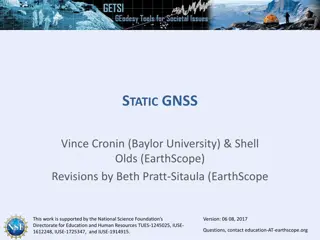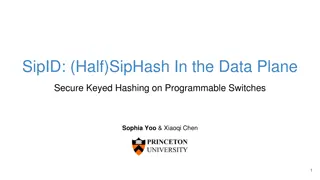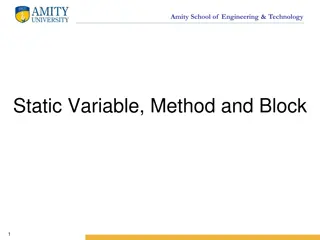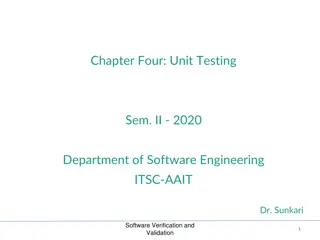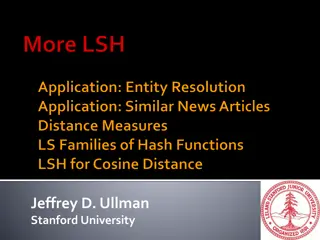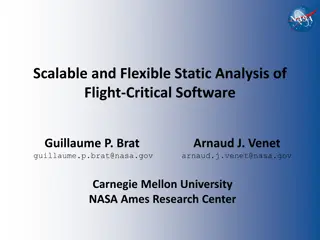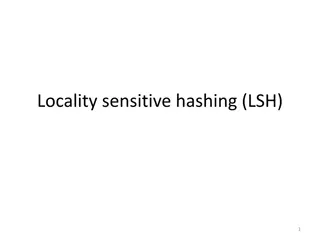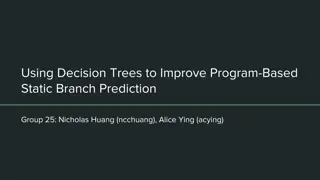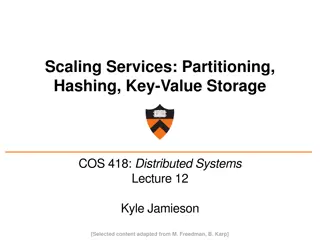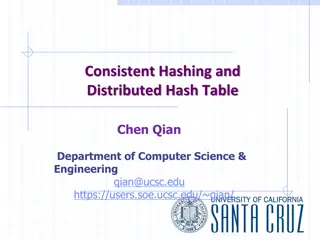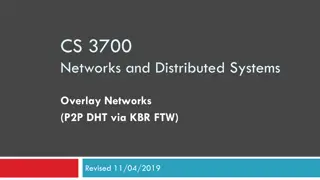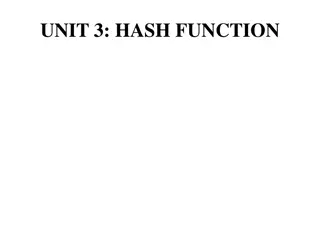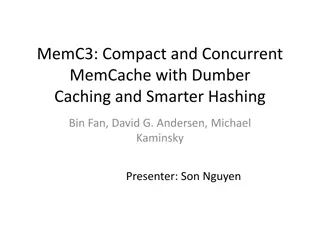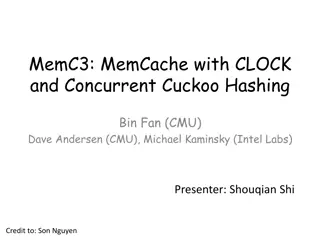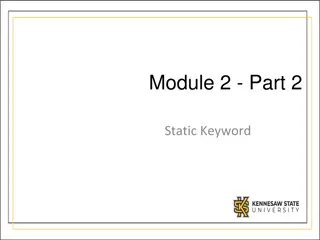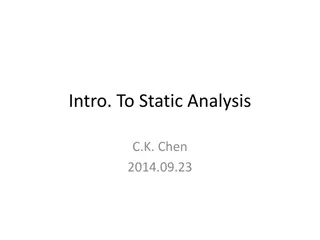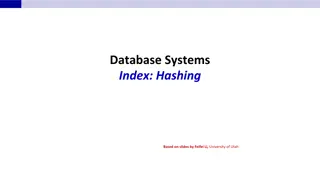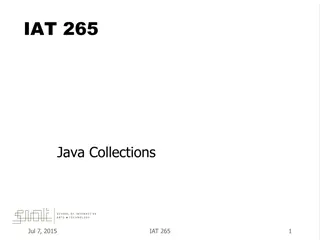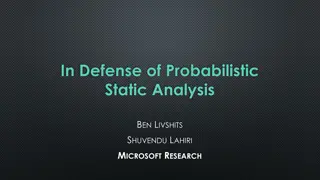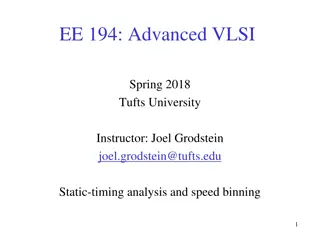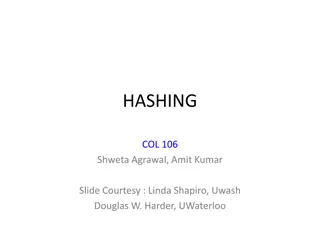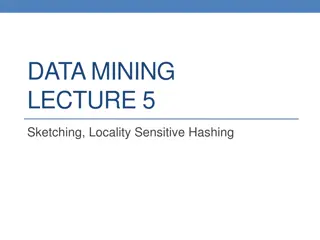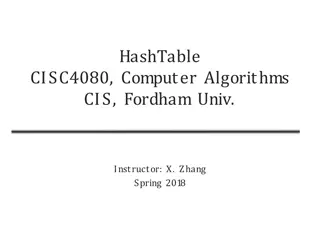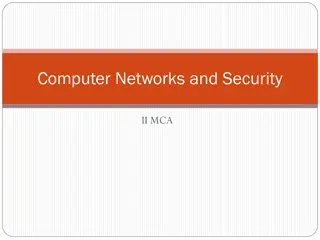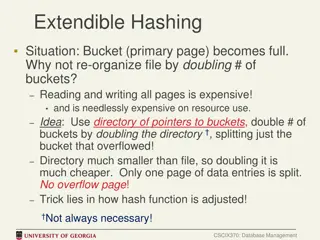Understanding Static GNSS Techniques and Products for Geospatial Applications
This educational material provides insights into static GNSS techniques, products, and their societal benefits. It covers topics such as distinguishing static GNSS techniques, understanding different products, and the capabilities of static GNSS stations. The content explores the Network of the Amer
3 views • 20 slides
Static Analysis Techniques Overview
Explore static analysis techniques such as syntactic analysis, dataflow analysis, and model checking. Understand the concept of basic blocks in static analysis and their boundaries. Dive into the opportunities provided by static analysis in summarizing program behavior without executing it.
9 views • 27 slides
Exploring Electricity Concepts: From Atoms to Static Electricity
This content delves into the basics of electricity, covering topics such as atoms, charges, static electricity, simple circuits, and more. Learn about the difference between naturally occurring and human-harnessed electricity, explore the concept of charges in objects, and discover how static electr
5 views • 14 slides
Comparison Between Static and Dynamic Program Instrumentation
The difference between static and dynamic program instrumentation lies in when the analysis or measurement probes are inserted into a program. Static instrumentation occurs before the program is run and is more closely associated with proactive software evaluation. Dynamic instrumentation, on the ot
5 views • 14 slides
Secure Keyed Hashing on Programmable Switches
Explore the implementation challenges and opportunities for improved security, privacy, performance, and reliability in data plane applications using (Half)SipHash and CRC32 hashing techniques. Discover the vulnerabilities associated with CRC32 and the need for secure hashing solutions like SipID. L
0 views • 17 slides
Software Testing Foundation Level - Static Testing Quiz by Uwe G. hl
This quiz focuses on static testing in software development, covering topics such as roles in formal reviews, activities in review planning, types of review processes, benefits of static testing, and checklist-based review scenarios. Test your knowledge on static testing concepts with these practice
1 views • 20 slides
Understanding Static Variables and Methods in Java
Static variables in Java belong to the class rather than instances of the class and are initialized only once at the start of execution. They can be accessed directly by the class name. Similarly, static methods can access static variables directly without creating an object. This content explains t
1 views • 20 slides
Importance of Static Unit Testing in Software Development
Unit testing is a crucial aspect of software development, involving both static and dynamic approaches. Static unit testing, such as code inspections and walkthroughs, helps in finding errors early, reducing costs and improving reliability. By examining code behavior against requirements and involvi
0 views • 27 slides
Understanding Scrypt: Maximally Memory-Hard Functions
Scrypt is a memory-hard function designed for password hashing and key derivation, aiming to thwart brute-force attacks by making evaluation moderately hard. It emphasizes the need for memory intensity over computation, hindering the advantages of special-purpose hardware, parallelism, and amortizat
0 views • 59 slides
Entity Resolution Problem in Customer Data Matching
The challenge of entity resolution, especially in the context of matching customer data between companies, is addressed in this content. The scenario involves accurately identifying which records correspond to the same individuals despite potential variations or errors in the data. Strategies such a
1 views • 56 slides
The Wonders of Electricity: From Appliances to Static Energy
Explore the fascinating world of electricity through everyday activities like making toast and doing laundry, and learn about static electricity and how it can make hair stick to balloons and sweaters. Remember to plug things in for power and discover the magic of static electricity generated by rub
0 views • 5 slides
Comprehensive Overview of Binary Heaps, Heapsort, and Hashing
In this detailed review, you will gain a thorough understanding of binary heaps, including insertion and removal operations, heap utility functions, heapsort, and the efficient Horner's Rule for polynomial evaluation. The content also covers the representation of binary heaps, building initial heaps
0 views • 24 slides
Understanding Static Routing in Network Infrastructure Workshops
Explore the concepts of static routing in networking workshops, covering Unix and Cisco network interface configurations, static routes, default routes, and advantages and disadvantages of static routing. Learn about IP routing configuration, assignment of IPv4 addresses, and FreeBSD network interfa
4 views • 37 slides
CSE 373 - Hashing Concepts and Exam Preparation
Introduction to hashing in CSE 373, covering basic concepts, hash functions, collision resolution, and runtimes. Exam details for Friday's practice exam include topics on Stacks, Queues, BigO Notation, Heaps, Trees, Design Tradeoffs, and exam format with emphasis on theoretical understanding. Lectur
0 views • 38 slides
Static Analysis in Flight-Critical Software
Explore the challenges and advancements in static analysis for flight-critical systems, focusing on the importance of soundness and assurance through tools like IKOS, MathWorks PolySpace, and ASTREE. Learn about the limitations of testing in detecting critical errors and how static analysis can offe
0 views • 23 slides
Understanding Static Electricity in Spray Painting of Cars
Spray painting in the automotive industry utilizes static electricity to create an efficient and effective painting process. By charging the paint particles and the object being painted, the paint adheres better, resulting in a more even coating. This method not only speeds up the painting process b
0 views • 5 slides
Understanding Locality Sensitive Hashing (LSH) for Nearest Neighbor Queries
Locality Sensitive Hashing (LSH) is a technique used to efficiently find nearest neighbors in high-dimensional spaces. By grouping similar points into the same hash bucket, LSH enables fast search for nearest neighbors, overcoming the curse of dimensionality. Variants include k-nearest neighbors and
0 views • 41 slides
Using Decision Trees for Program-Based Static Branch Prediction
This presentation discusses the use of decision trees to enhance program-based static branch prediction, focusing on improving the Ball and Larus heuristics. It covers the importance of static branch prediction, motivation behind the research, goals of the study, and background on Ball and Larus heu
0 views • 36 slides
Understanding Static Electricity: Two Kinds of Charges
Explore the concept of static electricity and the two types of charges - positive and negative - present in matter. Learn how charges can be separated through rubbing or pulling objects, leading to the buildup of static electricity. Unravel the properties of particles in matter and the significance
0 views • 16 slides
Scaling Services and Key-Value Storage Techniques
This content delves into various aspects of scaling services, including partitioning, hashing, and key-value storage. It discusses vertical and horizontal scalability, the chaotic nature of horizontal scaling, techniques for partitioning data, and case studies like Amazon Dynamo. The importance of p
0 views • 48 slides
Understanding C++11 Features and Design Patterns by Mark Redekopp
Explore the key concepts of C++11 features and design patterns explained by Mark Redekopp, focusing on static members, unique ID assignment for students, and the use of static data members in classes. Discover best practices for ensuring unique IDs for students and efficiently utilizing static membe
0 views • 24 slides
Procedural Decomposition and Static Methods in Programming
Understanding procedural decomposition and static methods is essential in programming to reduce redundancy, organize code effectively, and manage complexity. Procedural decomposition involves dividing a problem into methods, while static methods help in code reuse and managing complexity. By designi
0 views • 18 slides
Understanding Consistent Hashing and Distributed Hash Table
Explore the concept of consistent hashing and distributed hash tables to efficiently store and retrieve web pages across multiple servers. Learn how hashing functions and algorithms can distribute data evenly, handle server additions smoothly, and minimize object relocations. Discover the benefits o
1 views • 36 slides
Overlay Networks and Consistent Hashing in Distributed Systems
Understanding the concept of overlay networks and consistent hashing in distributed systems is crucial for scalability and efficient data storage. Overlay networks like P2P DHT via KBR offer a decentralized approach for managing data while consistent hashing provides a balanced and deterministic way
0 views • 36 slides
Adapting Linear Hashing for Flash Memory Constrained Embedded Devices
This research explores the adaptation of linear hashing for improved data handling on flash memory-constrained embedded devices. Motivated by the increasing data collection by IoT devices, the study focuses on implementing database structures like a linear hash table for efficient data processing. T
0 views • 67 slides
Understanding Hash Functions in Data Structures
Hash functions are crucial in storing data efficiently by converting a sized amount of data into a single integer. They are used to generate hash values, hash codes, or hash sums, which serve as indexes in arrays. The hash function should be quick to compute and distribute hash addresses uniformly t
0 views • 200 slides
Enhancing MemC3: Compact and Concurrent MemCache for Improved Performance
MemC3 introduces a novel approach to compact and concurrent caching through dumber caching and smarter hashing techniques, addressing key issues faced by traditional memory caching systems. By implementing CLOCK-based LRU, approximate LRU, and utilizing Cuckoo Hashing, MemC3 achieves significant imp
0 views • 20 slides
Enhancing Key-Value Storage with MemC3 and Cuckoo Hashing
MemC3 is a specialized key-value store that combines CLOCK and Concurrent Cuckoo Hashing to improve performance and efficiency. Memcached, an established DRAM-based key-value store, is also discussed along with its LRU eviction strategy. The use of internal chaining hashtable and LRU caching in Memc
1 views • 23 slides
Understanding Static Variables and Methods in Object-Oriented Programming
Explore the concept of static variables and methods in object-oriented programming. Learn how static attributes are shared among all instances of a class, enabling a single copy of the variable to be used across objects. Discover examples and illustrations demonstrating the use of static variables f
0 views • 18 slides
Introduction to Static Analysis in C.K. Chen's Presentation
Explore the fundamentals of static analysis in C.K. Chen's presentation, covering topics such as common tools in Linux, disassembly, reverse assembly, and tips for static analysis. Discover how static analysis can be used to analyze malware without execution and learn about the information that can
0 views • 54 slides
Understanding Database Index Hashing Techniques
Hashing-based indexing in database systems is efficient for equality selections but not suitable for range searches. Both static and dynamic hashing methods exist, with static hashing involving fixed primary pages that are allocated sequentially. The process involves determining the bucket to which
0 views • 41 slides
Understanding Data Structures and Hashing in Java
Data structures play a crucial role in organizing, iterating, adding, deleting, and searching data efficiently. Hash tables, linked lists, trees, and more are explored in this overview, highlighting their strengths and trade-offs. Hashing, collision resolution strategies, and the importance of a wel
0 views • 19 slides
Benefits of Probabilistic Static Analysis for Improving Program Analysis
Probabilistic static analysis offers a novel approach to enhancing the accuracy and usefulness of program analysis results. By introducing probabilistic treatment in static analysis, uncertainties and imprecisions can be addressed, leading to more interpretable and actionable outcomes. This methodol
0 views • 11 slides
Understanding Static Timing Analysis in Advanced VLSI Design
Static timing analysis is a crucial aspect of VLSI design, helping predict chip performance before fabrication. This article explores the importance of static timing analysis, its effectiveness, and the limitations of dynamic simulation tools like SPICE. Learn about the challenges in testing critica
0 views • 76 slides
Understanding Hashing: Efficient Data Storage and Retrieval
Hashing is a powerful technique for achieving constant time complexity in finding and inserting data. It allows for quick access without the need for ordered elements. Direct addressing, limited hash operations, and efficient storage methods are discussed in this content to optimize data retrieval s
0 views • 100 slides
Understanding Sketching and Locality Sensitive Hashing in Data Mining
Explore the concepts of Jaccard Similarity and Cosine Similarity in data mining, along with their applications in recommendation systems and finding near-duplicates. Discover how Sketching and Locality Sensitive Hashing techniques help in efficiently identifying similar items and solving the Nearest
0 views • 63 slides
Understanding Hash Tables and Hashing Concepts in Computer Algorithms
This content delves into the concept of Hash Tables, covering topics such as the support for dictionary operations, achieving constant time through direct address tables, case studies in web server maintenance, and an exploration of hashing functions and collision avoidance. It also touches upon key
0 views • 40 slides
Understanding Static Electricity and Electrostatics
Static electricity is a result of electric charge buildup on insulating materials due to friction, causing electrons to transfer and create a charge difference. This can lead to phenomena like a balloon sticking to a wall. The origin of static charge lies in the electrons and protons within atoms, w
0 views • 9 slides
Understanding Network Security Principles and Techniques
Explore the fundamental concepts of network security, including issues of confidentiality, integrity, and non-repudiability. Learn about the challenges of securing networks and the types of attacks that computer systems face. Dive into basic security techniques like hashing and symmetric key cryptog
0 views • 36 slides
Efficient Bucket Management in Extendible Hashing
In cases where a bucket (primary page) becomes full in extendible hashing, re-organizing the file by doubling the number of buckets can be costly in terms of resource utilization. An alternative approach involves using a directory of pointers to buckets and doubling the directory instead of all buck
0 views • 9 slides
